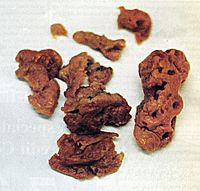 Fiji
is home to Jaspis coriacea, a simple orange sponge. That sponge is
home to a miraculous chemical dubbed a Beqamide after Beqa Lagoon
where, so far, the highest yield of the chemical has been identified.
The trouble is, no one has ever been able to look anywhere else. Until,
that is, (USP) Masters student from Australia, Stan Flavel, met NAI'A
and talked us into spearheading a wide-ranging, long-term field research
project. Our mission is to collect samples of this sponge - and several
other medically important species - to take back to Flavel in the
laboratory for analysis.
Fiji
is home to Jaspis coriacea, a simple orange sponge. That sponge is
home to a miraculous chemical dubbed a Beqamide after Beqa Lagoon
where, so far, the highest yield of the chemical has been identified.
The trouble is, no one has ever been able to look anywhere else. Until,
that is, (USP) Masters student from Australia, Stan Flavel, met NAI'A
and talked us into spearheading a wide-ranging, long-term field research
project. Our mission is to collect samples of this sponge - and several
other medically important species - to take back to Flavel in the
laboratory for analysis.
The collection method is simple enough - once you find the sponges! But it is the detail recorded about the sponge that is so crucial. And this is where we recruit the keen eyes and intelligent minds of our passengers. Each sample must be photographed and the site growth and re-growth (after sampling) monitored carefully. The time, day, depth, place, water clarity, salinity and content, current and light levels must be recorded. Also, each sponge leads an active private life that Flavel needs to be privy to. Who eats it and when? Who are its neighbors, friends and enemies? How does it earn a living? How does it look first thing in the morning? Who does it date at night?
All these facts are clues in the mystery surrounding why this promising anti-tumor agent is produced - and how? If Flavel can discover that, he may also be able to work out how to raise these sponges (notoriously difficult to domesticate) and produce high quantities of a drug able to beat one of modern society's most ruthless killers at its own game.
Who knows, Fiji's next big industry may be farming and harvesting life-saving sponges! It sure beats open-cut gold and copper mining...
